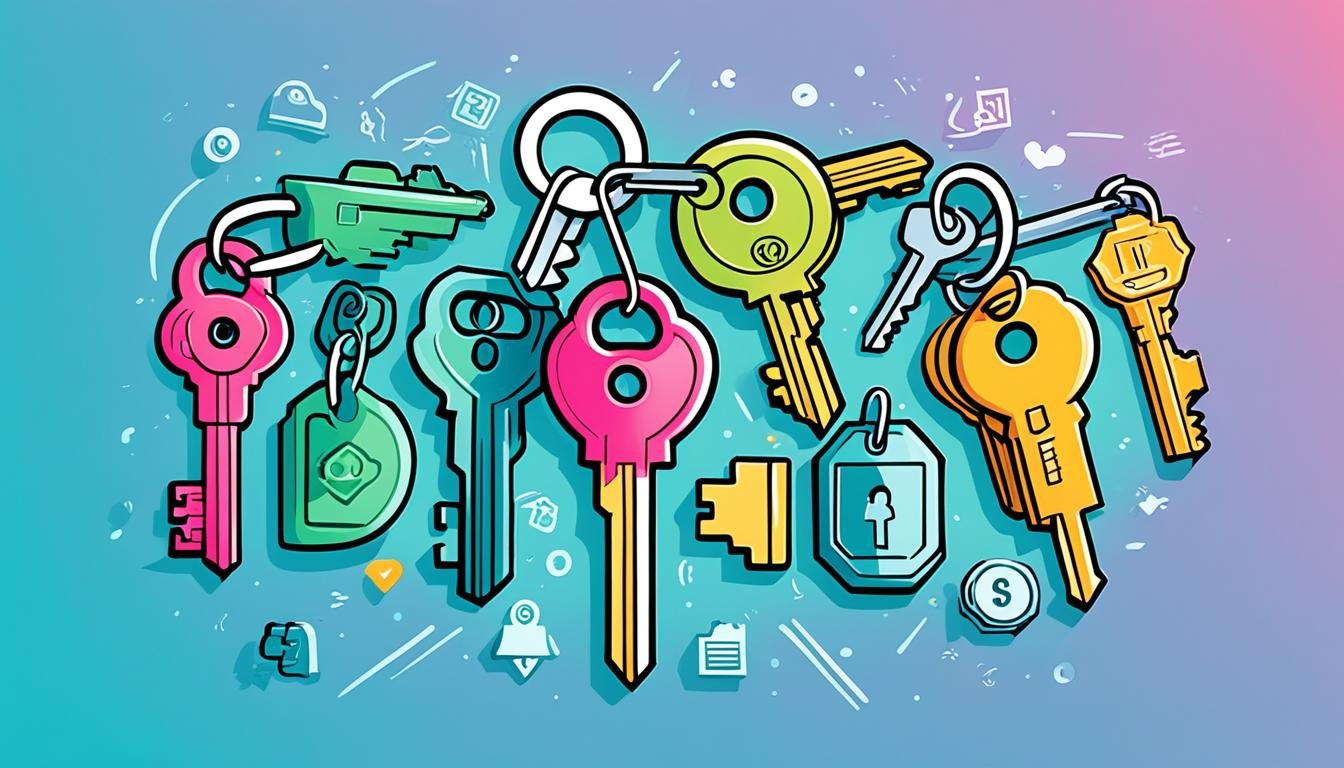Financial Wellness: The Key to Unlocking the Rich Life (That You Didn’t Know You Needed)
Did you know 40% of Americans can’t easily handle a $400 surprise bill? This fact points to a big need for financial wellness. It’s not just about getting rich. It’s about learning money management, working on wealth creation, and making financial stability the foundation of a truly rich life. We’ll show you the key parts of financial wellness and how it can deeply improve every part of your life.
Key Takeaways
- Understanding financial wellness as a multi-faceted concept that transcends mere wealth accumulation
- Identifying actionable strategies for effective money management and wealth creation
- Realizing the deep connection between financial stability and overall quality of life
- Emphasizing the importance of developing a holistic approach to managing personal finances
- Highlighting the transformative power of financial wellness in achieving a rich and satisfying life
The Intersection of Mental Health and Financial Wellness
Money issues can deeply affect our mental health. Feeling stressed about finances is common and can weigh us down. It’s important to know that getting rich isn’t just about having money. It’s also about being strong mentally and valuing ourselves.
The Psychological Effects of Money Stress
Worrying about money is a big problem for many. It can cause anything from slight worry to deep anxiety. This stress doesn’t just stay in our minds. It can make us lose sleep and get sick more easily. Seeing these warning signs is key to dealing with money-related stress.
Transforming Your Financial Mindset for Emotional Wellbeing
Thinking differently about wealth is more than changing how we handle money. It’s about how money affects our feelings and everyday life. Changing our view on money means looking inside ourselves and being ready to change old ideas. This makes our money choices better match what we truly value, leading to happiness and less stress.
Aligning Self-Esteem with Wealth Creation
Building a good relationship between feeling good about ourselves and making money starts with believing in our abilities. By linking self-esteem and making money, we become more active in getting rich. Our value comes not just from money, but also the effort we put in. Keeping a healthy balance between feeling good about ourselves and our financial goals boosts our confidence.
The link between mental health and financial wellness is important and complex. Understanding this link helps us live better, with both mental strength and financial security. True wealth means being happy and prosperous, not just having money.
Exploring Your Money Code and Beliefs
Understanding your financial beliefs and money mindset is key to grasping your money code. This is an unseen guide for how you view and handle money, shaping your financial habits. To change your money relationship, exploring these personal beliefs is necessary.
Your money mindset impacts your present and future finances. It blends your past, the financial lessons you’ve learned, and your subconscious patterns. Negative patterns can block your prosperity.
Jim Rohn once said, “If you don’t like where you are, change it. You’re not a tree.”
It’s crucial to face and improve your financial beliefs for a positive, abundant money mindset. This demands honesty and self-reflection to find and fix barriers to financial health.
Mapping your money thoughts helps identify beliefs’ roots and how they shape your money code. Knowing this leads to better financial habits.
| Belief Origin | Impact on Money Mindset | Financial Habit Formed |
|---|---|---|
| Childhood Observations | Basic views on spending and saving | Tendency towards saving or spending freely |
| Cultural Influences | Community views on handling money | Giving to charity or group investing |
| Educational Experiences | Learning about finance | Focus on financial knowledge and planning |
| Personal Milestones | Influences on investment choices | Planning for retirement or buying property |
Addressing your core beliefs can free and help rewrite your financial story. With this knowledge, you can redo your money code for a better financial future.
Being proactive in this area is a big step towards financial wellness. It takes work to make these changes lasting. The effort is tough, but the rewards in how you see money are worth it.
Overcoming Generational Cycles of Scarcity
Many of us know about generational cycles that influence our money habits. These cycles can trap families in a scarcity mindset. It’s more than changing a budget. It’s about seeing wealth differently. With an abundance mindset and legacy planning, we can change our financial future. This benefits us and future generations too.
Identifying and Breaking Financial Patterns
Realizing our financial patterns is the first important step. These are the money habits we get from our parents. To break free, we must acknowledge the cycle, understand it, and decide to change. This journey is personal and tough. It means looking closely at our money choices and being strong to change them.
Creating a Legacy of Abundance
Changing a scarcity mindset to an abundance one changes our lives. It becomes the base for legacy planning. We create a new story of wealth for our children. This legacy includes wealth but also how to keep and grow it. An abundance mindset prepares future generations to do well. They won’t have the same limits their ancestors did.
Beating these cycles takes changing how we see success and wealth. It means teaching the next generation how to do well. This will look different for every family. But at its core, it’s about leaving scarcity behind. It’s about making a better future possible.
Financial Wellness: Crafting Your Roadmap to Stability
Starting your journey to financial wellness can feel daunting. Yet, a financial roadmap is key to reaching stability. It’s important to set clear financial goals first. These goals act as markers on your path. They help ensure every decision supports your bigger dreams. Whether it’s becoming debt-free, buying a house, or saving for retirement, these goals start your financial planning.
To show how to make a good financial roadmap, think about this table. It groups goals into short-term, medium-term, and long-term:
| Time Frame | Financial Goals | Action Step |
|---|---|---|
| Short-Term (1-2 years) | Emergency Fund | Save 10% of monthly income |
| Medium-Term (3-5 years) | Down Payment on a Home | Invest in a high-yield savings account |
| Long-Term (6+ years) | Retirement Savings | Max out IRA contributions annually |
With goals set, it’s time to think tactics in financial planning. Decide on the best saving methods, investments, and risk strategies for each goal. Your roadmap can change. It should grow as your life and the financial world do.
Review your roadmap regularly to stay on course. This lets you adapt to changes and avoid financial obstacles. Being both proactive and reactive is critical.
“A goal without a plan is just a wish.” – Antoine de Saint-Exupéry
Keep your eyes on your progress and celebrate all wins, big or small. Watch your spending carefully. Being consistent, patient, and dedicated will help you succeed.
Using tech tools for financial planning is vital too. Budget apps, financial software, or even spreadsheets can keep your plan clear and precise. They help you see the big picture and track details closely.
Move forward boldly, knowing your financial roadmap will lead you to financial security. Each step is planned carefully towards a stable future.
The Art of Budgeting and Money Management Tips
Getting good at budgeting and money management is key to financial health. Learning to handle your money well leads to a stable and bright future. It’s important to spend wisely and keep track of your expenses. Also, financial tools are out there to help manage your money better and give you instant updates on your spending.
Strategies for Smarter Spending
The first step to spend smarter is knowing what money comes in and what goes out. Being proactive with your spending helps cut down on what you don’t need. Here are some smart spending tips:
- Figure out what you really need versus what you want.
- Look for deals and compare prices to save money.
- Check if you’re still using your subscriptions and memberships.
- Use the 50/30/20 rule for living costs, fun, and savings.
Tools for Tracking and Managing Expenses
Today, there are lots of digital tools to help you keep an eye on your spending and plan your budget. With the right apps and software, it’s easier to monitor and adjust your budget anytime. Here are some great tools to check out:
| Tool | Features | Benefits |
|---|---|---|
| Mint | Synching with bank accounts, automated categorization, budget creation. | Give you a clear view of your money, free, and easy budget setting. |
| You Need a Budget (YNAB) | Proactive budgeting, goal tracking, educational resources. | Helps plan for the future, improves money know-how, aids in reducing debt. |
| Personal Capital | Investment tracking, retirement planner, net worth calculator. | Great for long-term plans, offers complete wealth management tools. |
Using these tools everyday gives you a detailed look at your money. This makes reaching your financial goals doable. Whether through smart budgeting or high-tech apps, being in control of your money is empowering.
Nurturing Your Relationship with Money
A relationship with money is crucial for your financial health. It’s more than the sum in your bank account. It involves creating a financial mindset that encourages positive growth. Like any important relationship, the one with your finances needs understanding and work. Aligning your money habits with your financial values paves the way to financial wellness.
Looking closely at how we deal with money each day gives us valuable insights. The values we live by affect our financial decisions. Embracing values like integrity, carefulness, and kindness shapes our spending and saving. This leads to better financial choices. Let’s consider key steps to improve this vital part of your life.
- Review your current financial status – assess where you stand and where you wish to be.
- Analyze your income and spending – locate patterns that either support or undermine your goals.
- Set clear financial goals that reflect your values and aspirations.
- Develop a tailored, actionable plan that you can consistently follow.
| Money Habit | Reflection of Financial Value | Impact on Financial Mindset |
|---|---|---|
| Budgeting | Responsibility | Encourages control and foresight |
| Saving | Prudence | Cultivates a sense of security |
| Investing | Growth-Oriented | Builds wealth and a forward-thinking attitude |
| Giving | Generosity | Promotes a sense of community and compassion |
Taking these steps sincerely can change your view of money from stress to success. Remember, achieving a positive financial mindset is not quick. It is a continuous journey. It requires dedication to your financial beliefs.
Educational Journeys: The Importance of Financial Literacy
Learning about money is more than just collecting facts. It’s key for financial wellness. Knowing and using financial concepts helps people manage changes in money matters. It lets them make smart choices for their future. This is the start of financial education, which encourages ongoing personal and financial growth.
Understanding Financial Concepts and Products
Understanding financial concepts is at the core of financial literacy. People learn about interest rates, the need to save for retirement, and how debt affects them. Knowing about different financial products, like insurance and investments, helps people make choices that meet their future financial goals.
Engaging in Lifelong Learning for Financial Improvement
Mastering money matters is an ongoing process, not a one-time event. The financial world constantly introduces new products, rules, and economic conditions. By staying informed and flexible, individuals can adapt and improve their financial situation over time.
| Financial Literacy Component | Benefits | Examples |
|---|---|---|
| Budgeting and Saving | Fosters financial stability and future preparedness | Personal budgets, emergency funds |
| Credit Management | Improves credit standing and access to loans | Credit score monitoring, debt repayment strategies |
| Investment Knowledge | Enhances potential for wealth accumulation | Stocks, bonds, retirement accounts |
| Risk Assessment | Encourages informed decision-making under uncertainty | Insurance plans, diversified portfolios |
Finance education prepares us to avoid risks and grab opportunities. It’s key for financial success. As our knowledge and skills grow, our view of money changes from fear to confidence. This is what financial empowerment is all about: a personal and evolving journey.
Investing in Your Future: Wealth Management Essentials
Strong financial health is not just about saving. It’s about smart investing for growth too. Knowing the basics of wealth management and asset allocation is crucial. These concepts help you grow your money, reduce risks, and strengthen your financial state.
At the heart of managing wealth is a smart investment plan. This plan helps you choose the right investment paths. Here’s what every investor needs to consider:
- Identifying long-term financial goals and matching them with your investments.
- Knowing how much risk you can handle.
- Staying updated on market trends and growth opportunities.
Asset allocation is about spreading your investments, not just picking winners. It means diversifying across different areas—like stocks, bonds, and real estate. This balance can lead to growth while protecting you from market lows.
“Diversification and asset allocation strategies do not ensure a profit and do not protect against losses in declining markets.” – A principle that seasoned investors live by.
Here’s how you can apply these strategies:
- Look at your finances and investment choices to meet your goals.
- Choose a mix of assets that fits your age, income, and future needs.
- Keep an eye on your portfolio and adjust it as needed.
By following these key points, you’re investing in a brighter future. Your choices now will shape your financial success later.
Incorporating Mindfulness into Your Financial Plan
Adding mindfulness to your financial plan can change how you see money. It connects your economic aims with personal happiness. This idea, known as financial mindfulness, makes you more aware of how you deal with money. It changes your financial habits for the better.
Mindful Spending Practices
Being careful with your spending is more than just saving money. It means your purchases reflect your true values and life goals. This approach needs patience and the willingness to change old habits that don’t fit your ideal life anymore.
- Track your spending and note the emotional drivers behind them.
- Pause and reflect before each purchase to decide if it’s necessary or emotionally driven.
- Use budgeting apps that nudge you towards mindful spending choices.
Using Reflective Techniques for Financial Decisions
Reflective techniques help you make financial choices calmly, not on a whim. With reflection, you face financial ups and downs wisely. You do this with a clear mind and a heart that’s at peace.
- Journaling insights after reviewing monthly finances to identify recurring patterns.
- Engaging in quiet meditation before making significant financial commitments.
- Consulting with a financial planner for an objective analysis of your financial habits.
Using mindful methods in finance boosts your money health and life happiness.
| Mindful Practice | Benefit |
|---|---|
| Consistent Tracking | Increased awareness of spending habits. |
| Reflective Pause | Reduces impulsive purchases and promotes intentional buying. |
| Meditative Decision Making | Encourages stress-free financial choices. |
Conclusion
Stepping into financial wellness is more than just handling money. It transforms your life, bringing both wealth and joy. Through learning solid money management, we aim for financial stability and growing wealth. This journey also enhances our personal happiness, not just our bank balances.
Building a good relationship with money starts with understanding the link between our mental well-being and financial stress. We learn to change our mindset about money. This helps break free from past limits. With tips on budgeting and investing, we gain the tools to create a stable future.
Financial wellness blends a good life with smart money moves. It’s about forming good money habits and learning about finance. Making thoughtful financial choices leads to a prosperous life. This commitment to learning about finance opens up opportunities for wealth and personal development.
FAQ
What is financial wellness?
Financial wellness is about more than just having money. It’s about achieving a healthy balance in your finances. Managing your money well, creating wealth, and ensuring stability are key aspects.
How does mental health impact financial wellness?
Stress from money worries can hurt our mental health. It can lead to anxiety, depression, and more stress. Addressing mental health helps maintain emotional well-being and self-esteem with money.
How do our beliefs influence our financial wellness?
The way we think about money shapes our financial choices and habits. Knowing our money beliefs helps us make better financial decisions.
What are generational cycles of scarcity?
Generational cycles of scarcity see financial habits pass down through families. To shift to abundance, we must understand and change these patterns.
How can I create a financial roadmap?
A strong financial plan is crucial for long-term wellness. It starts with setting goals and planning your finances carefully.
What are some budgeting and money management tips?
Key to financial wellness is learning how to budget and manage money well. This includes smart spending and using tools to track expenses.
How can I develop a healthy relationship with money?
A healthy money relationship is vital for wellness. It means thinking positively about finances, forming good habits, and making choices that reflect your values.
Why is financial literacy important?
Understanding money is essential for wellness. Financial literacy helps you make smart money decisions. Lifelong learning enhances your financial skills for better future stability.
How can I start investing for my future?
Investing is key to growing wealth and securing your future. Learning about investment options and strategies helps you make wise decisions for long-term growth.
How can mindfulness help with financial wellness?
Mindfulness makes you more aware of your spending and financial choices. Practices that encourage reflection improve your financial decisions.







